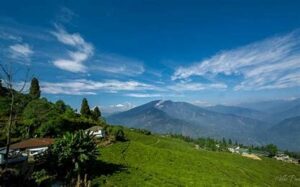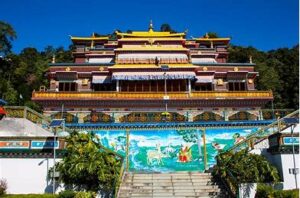Ningol Chakouba is a cherished social festival celebrated by the Meitei community of Manipur, a northeastern state in India. This festival strengthens familial bonds and promotes unity among loved ones. The name ‘Ningol Chakouba’ itself speaks volumes about its essence – ‘Ningol’ means married daughter and ‘Chakouba’ refers to an invitation to a grand feast. Families invite their married daughters to their parental homes for a special meal, reviving ties and reinforcing emotional connections.
Ningol Chakouba is more than a festival; it is a cultural tradition deeply rooted in the history, beliefs, and customs of the Meitei people. Through this festival, the community celebrates love, affection, and mutual respect among family members.
Historical Roots
The origins of Ningol Chakouba can be traced back to ancient Manipur, where the Meitei kings promoted the festival to maintain familial unity and harmony. Historically, it was an occasion where married daughters, often away with their in-laws, were called back to their parental homes for a feast and social gathering. This festival holds historical significance as it highlights the importance of women and their pivotal role in maintaining family ties.
Ningol Chakouba was not only a social gathering but also a time to discuss familial issues and strengthen communal harmony. The tradition has been passed down through generations, with its relevance remaining undiminished in modern times.
Language and Communication
During Ningol Chakouba, the use of the Meitei language, Manipuri, is prominent. Conversations, storytelling, and traditional songs are often exchanged in the local language, which strengthens cultural identity. Language acts as a bridge connecting generations, allowing younger members to learn and appreciate their heritage.
Festivals and Celebrations
Ningol Chakouba is celebrated with great enthusiasm across Manipur and among Meitei communities worldwide. Preparations begin well in advance, with families making elaborate plans to welcome their married daughters. Special meals are prepared, often featuring traditional Manipuri dishes that reflect the community’s culinary heritage.
The day of the festival sees families dressed in traditional attire, welcoming their daughters with warmth and affection. Gifts are exchanged, and heartfelt conversations take place. The entire event fosters a sense of belonging and reinforces cultural values.
Arts, Crafts, and Music
Arts and crafts play a significant role in Ningol Chakouba. Handmade gifts, especially those crafted with local materials, are often exchanged. Manipuri dance and music, which are integral to the Meitei culture, are sometimes performed during the celebrations, adding vibrancy to the occasion.
The festival also showcases intricate designs in traditional textiles and ornaments, reflecting the artistic heritage of the community.
Cuisine and Culinary Traditions
Food is at the heart of Ningol Chakouba. Traditional Manipuri dishes such as Eromba, Ngari, Chak-hao kheer, and Ooti are commonly prepared. The meal is often elaborate and prepared with care, reflecting the family’s love and affection for their daughters.
The culinary practices during the festival are not just about food; they are also about preserving cultural recipes and cooking techniques passed down through generations.
Attire and Ornamentation
On Ningol Chakouba, families dress in their finest traditional attire. Women often wear Phanek and Innaphi, which are elegant Manipuri dresses, while men may wear Dhoti and Kurta. The ornamentation is also significant, with women adorning themselves with traditional Manipuri jewelry.
The attire worn during Ningol Chakouba reflects the community’s rich textile heritage and showcases the craftsmanship involved in creating these garments.
Beliefs and Values
Ningol Chakouba embodies values such as respect, affection, and unity. It emphasizes the importance of maintaining strong family ties, even after daughters have married and moved to new households. The festival highlights the community’s belief in familial harmony and mutual support.
Customs and Etiquette
Certain customs and etiquette are followed during Ningol Chakouba. Respecting elders, offering gifts, and preparing special meals are essential components of the festival. These customs are deeply ingrained in the community’s social fabric and are passed down through generations.
Hospitality is a key element of the celebration, with hosts ensuring that their guests feel welcomed and appreciated.
Architecture and Symbols
While Ningol Chakouba is primarily a social festival, the architectural style of traditional Manipuri homes adds to the celebration’s charm. Traditional houses with open courtyards are often used for the feasts, symbolizing openness and unity.
The layout of these homes, with ample space for gathering, reflects the community’s emphasis on togetherness.
Oral Traditions and Storytelling
Storytelling is an essential part of Ningol Chakouba. Elders often share tales of the past, teaching younger generations about the significance of the festival and other cultural practices. This oral tradition ensures the continuity of the community’s heritage.
Interactions with Nature
Manipuri culture is closely connected to nature, and this is evident during Ningol Chakouba. Fresh, organic ingredients are often used in the preparation of the feast, reflecting the community’s agricultural roots and respect for the environment.
Challenges and Preservation
Despite its popularity, Ningol Chakouba faces challenges from modernization and changing social dynamics. However, efforts are being made to preserve and promote the festival. Cultural organizations and families continue to uphold the traditions, ensuring that the festival remains relevant in contemporary society.
Contributions to the Broader Region and World
Ningol Chakouba has contributed significantly to promoting familial values, harmony, and respect. Its emphasis on strengthening family ties serves as an inspiration for communities beyond Manipur. The festival’s artistic, culinary, and cultural expressions have also enriched the region’s cultural tapestry.
Conclusion
Ningol Chakouba is not only significant to Manipur but also resonates with the broader Northeast Indian culture. Its themes of familial unity, cultural pride, and hospitality are shared by various communities across the region.
The festival serves as a reminder of the rich cultural heritage of Northeast India, highlighting its diversity and unique traditions.




